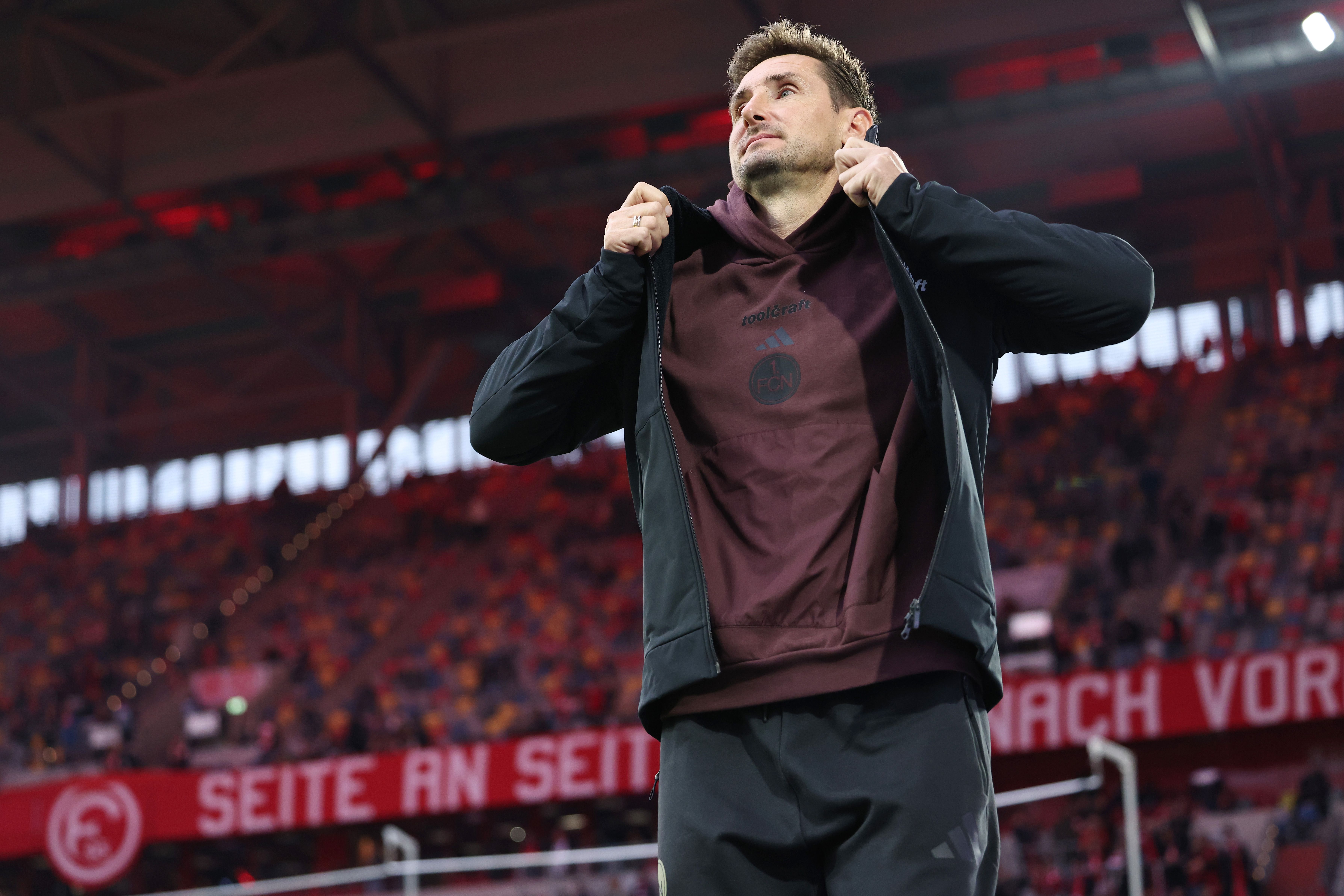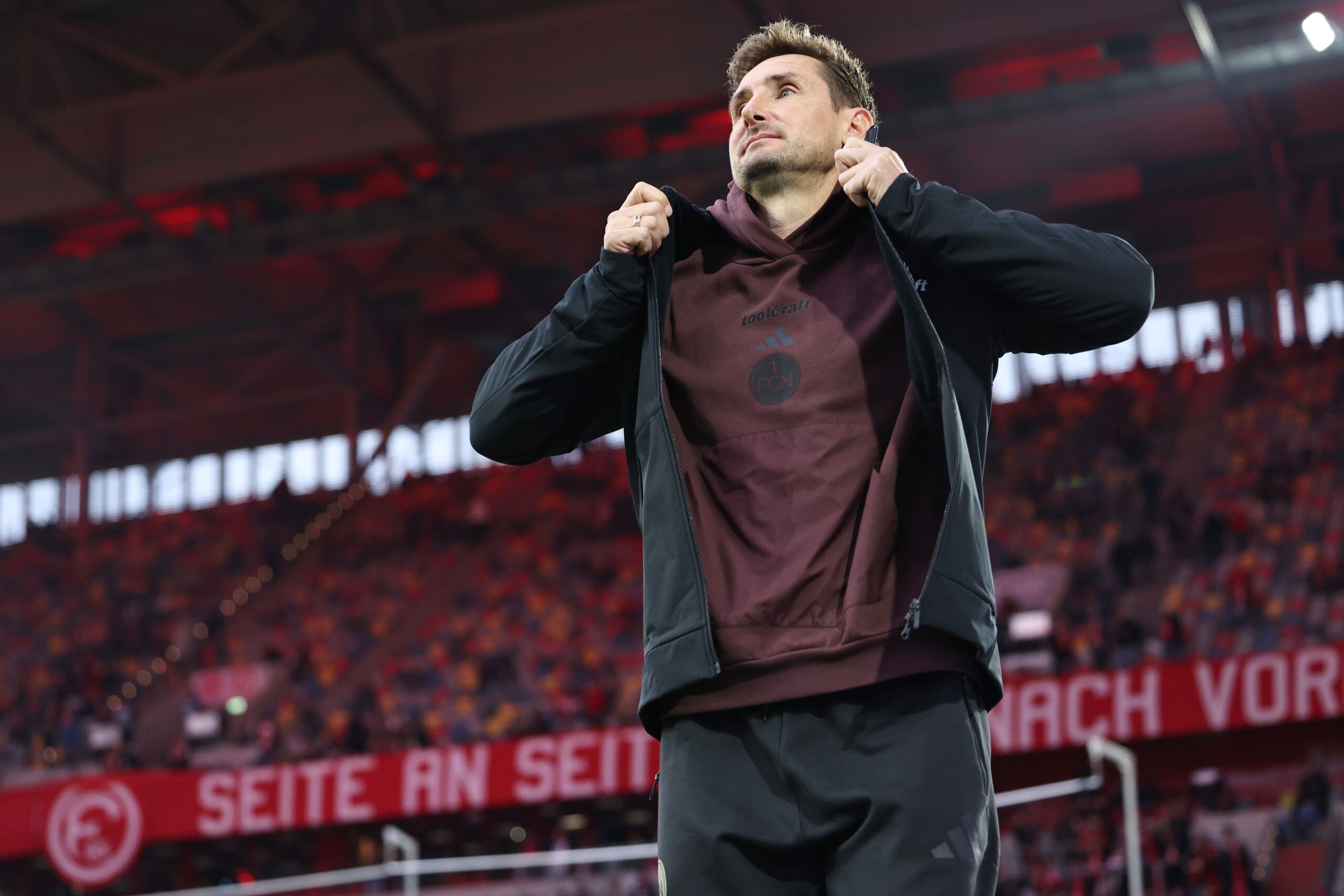Klose’s Future at 1. FC Nürnberg Hangs by a Thread: A Club in Crisis Reflects the Struggles of Leadership and Loyalty in Modern Sports
Miroslav Klose, a name synonymous with football excellence, now finds himself at a crossroads with 1. FC Nürnberg. As the current season approaches its climax, the uncertainty surrounding his future as head coach looms large. With his contract set to expire in the summer, the lack of concrete discussions regarding an extension has raised eyebrows among fans and analysts alike. Klose himself expressed his bewilderment in an interview, stating, “I haven’t heard anything at all. I’m totally out of the loop.” This sentiment highlights a broader issue within the club, reflecting the challenges of communication and decision-making in professional sports.
Klose’s tenure at Nürnberg began with high hopes. The former world-class striker, who holds the record for the most goals scored in FIFA World Cups, was brought in to instill a winning mentality and to guide the team back to the upper echelons of German football. However, the season has not unfolded as planned. A sluggish start has left the club struggling in the standings, and the pressure is mounting. In many ways, this mirrors the struggles faced by leaders in various sectors—whether in sports, politics, or business—where initial promise can quickly devolve into uncertainty and strife.
The club’s sporting director, Joti Chatzialexiou, has publicly stated that the intention is to build a long-term future with Klose at the helm. Yet, he also acknowledged that other pressing issues have diverted attention away from contract negotiations. This duality reflects a common theme in modern sports organizations: the balance between immediate performance and long-term vision. In an era where instant results are often prioritized, the patience required to develop a cohesive strategy can be overshadowed by the urgency of the moment.
Klose’s situation is emblematic of the broader challenges facing coaches in contemporary football. The landscape is increasingly unforgiving, with clubs often opting for quick fixes rather than nurturing talent and building a stable foundation. This trend can lead to a cycle of instability, where coaches are hired and fired based on short-term results, leaving little room for growth or evolution. Klose’s experience thus far at Nürnberg serves as a case study in this regard.
As the club navigates these turbulent waters, the upcoming matches will be pivotal. Klose has expressed a focus on making the next four games successful, indicating a determination to turn the tide. This approach is crucial not only for his personal future but also for the club’s trajectory. A strong finish to the season could bolster his case for an extension, while a continued lack of results may seal his fate. The pressure of performance is a familiar burden for coaches worldwide, but Klose’s legacy as a player adds another layer to the narrative.
The intersection of legacy and leadership is a compelling theme in sports. Klose’s status as a footballing icon brings heightened expectations, not only from the club’s management but also from the fanbase. Supporters who once cheered for him as a player now look to him to replicate that success in a managerial role. This duality can create a complex relationship between a coach and the fans, where past glories can amplify current frustrations.
In the context of 1. FC Nürnberg, the club’s rich history adds to the narrative. Founded in 1900, Nürnberg has a storied past, with multiple championships and a passionate fanbase. However, the club has faced challenges in recent years, including relegations and financial struggles. The desire to return to former glory is palpable among supporters, and Klose’s appointment was seen as a step in the right direction. Yet, the realities of the current season have cast a shadow over those ambitions.
Financial considerations also play a crucial role in the decision-making process. The economic landscape of football has evolved, with clubs increasingly reliant on sponsorships, broadcast deals, and fan engagement. A successful coach can significantly impact a club’s financial health, attracting investment and boosting merchandise sales. Conversely, a struggling team can lead to dwindling revenues and a loss of fan loyalty. The stakes are high, and the pressure on Klose to deliver results is immense.
As the clock ticks down to the end of the season, the Klose situation remains unresolved. The coming weeks will be critical in determining whether 1. FC Nürnberg and their coach can forge a path forward together. In the world of sports, where loyalty and leadership are often tested, Klose’s journey reflects the broader struggles faced by many in positions of authority. The intersection of ambition, expectation, and reality will ultimately shape the future of both the coach and the club, as they navigate the complexities of modern football.

It is still completely open whether Miroslav Klose will remain the coach of 1. FC Nürnberg beyond the current season. His contract expires in the summer—and so far, there do not appear to be any concrete talks about an extension. Speaking to Bild, Klose said: "I haven’t heard anything at all. I’m totally out of the loop. For me, the work here is what matters. I’m totally relaxed about it. For now, what matters to me is to make the next four games as successful as possible.”
The future of the former world-class striker has been occupying the club for some time. However, after a weak start to the season, potential plans had stalled. Nevertheless, the desire to continue with Klose is clearly present within the club. Sporting director Joti Chatzialexiou emphasized: “Basically, it is still the plan to build something long-term with Miro at FCN. Recently, however, we have had other issues that required our attention.”
This means the Klose situation remains unresolved for now—the coming weeks could be decisive in determining whether 1. FC Nürnberg and their coach will continue on their shared path.
This article was translated into English by Artificial Intelligence. You can read the original version in 🇩🇪 here.
📸 Christof Koepsel – 2025 Getty Images

